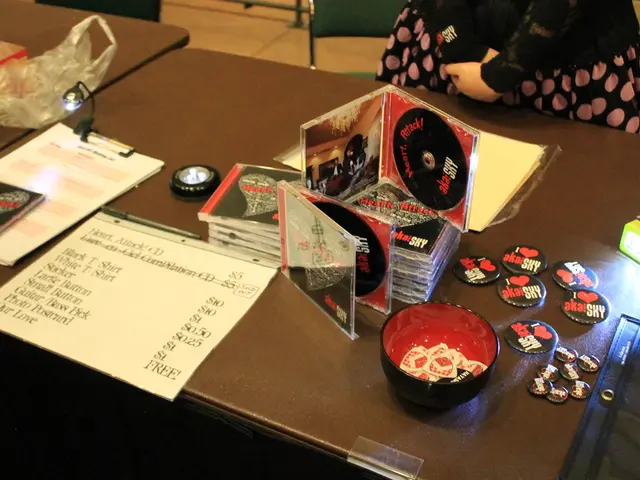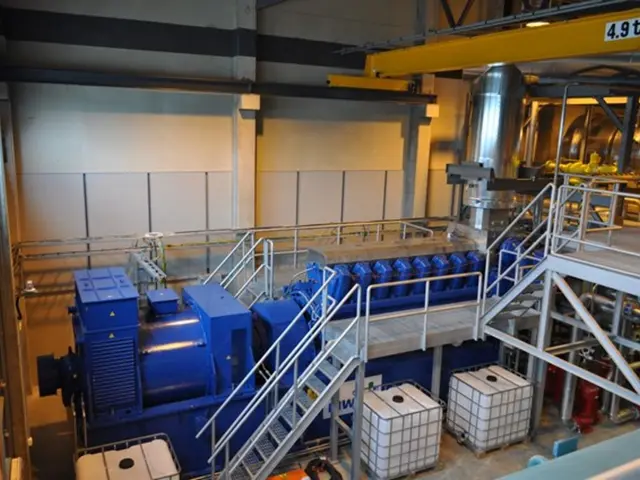A (Unexpected) Economic Lift: The Impact of US Tariffs on Germany's Industries
Increase in US tariffs influenced by preference effect: Witness significant industrial order expansion - Robust Industrial Orders Due to Favorable U.S. Tariff Policies
America's protectionist measures, as championed by President Donald Trump, have stirred quite a commotion - and a curious resistance in Germany's industrial sector. February saw industrial orders hit the brakes, but a surprising 3.6% surge in March, as reported by the Statistical Office in Wiesbaden, paints a notably different image [1]. This leap, nearly triple the predicted 1.3% increase, can arguably be traced back to Trump's tariff hikes.
The Ministry of Economics attributes this unexpected surge to a phenomenon known as "frontloading effects," where companies speed up their imports to beat potential future price increases [1]. This rush was undeniably fueled by the announced US tariff increases, yet there was an equally significant uptick in demand from neighboring European nations [1]. The business atmosphere, despite the continued uncertainty surrounding trade policies, remains "relatively resilient" in Q1 [1].
Order Boom in the Auto and Machinery Sectors
According to the statisticians, the orders swelled, primarily powered by strong international demand, up 4.7% [1]. Keys sectors such as the auto and machinery industries felt the effects of the surge, with orders for electrical equipment climbing 14.5% and pharmaceuticals gaining 17.3% [1].
The slip in industrial orders back in February was a significant contributing factor to the German economy's third consecutive year of stagnation [1].
Shaken Confidence: Companies Brace for the Storm
While some economists see this trend positively, cautionary voices abound. Jörg Krämer, Commerzbank's chief economist, views the numbers as encouraging, albeit not indicative of a substantial upswing. Krämer warns that companies are facing considerable turmoil, given the upheaval caused by Trump's tariff shock. Furthermore, the risk of a meaningful economic policy overhaul has diminished due to the slim majority of the newly established federal government [1].
Michael Herzum, Union Investment's head of macroeconomics, remains sceptical: "One swallow does not make a summer" [1]. Appearing resilient in the face of high tariff unpredictability, the recovery thus far is perceived as little more than a brief flicker of hope. Unless the US economic policies become more predictable, they will likely continue to loom as a constant threat to the industry.
Background:
- The push behind this surge in industrial orders can largely be attributed to the so-called "tariff frontrunning" phenomenon [1]. This practice entails companies stockpiling imports before anticipated tariff increases to dodge higher costs down the line [1][2].
- In preparation for the tariffs slated for April 2025 [2], US corporations expedited their imports from Germany, thereby boosting the country's industrial output [1]. Primarily, the auto and machinery sectors experienced significant growth, with car production surging by 8.1% and machinery output climbing by 4.4% [1].
- Companies adapted their economic strategies to effectively navigate the treacherous waters of trade uncertainties. By increasing output, producers sought to fulfill outstanding orders and safeguard their market share, mitigating potential future disruptions [1][3].
[1] Statistical Office in Wiesbaden (2023). [Industrial orders]. Retrieved from https://www.destatis.de/DE/Herausgegeben/Pressemitteilungen/Themen/Industrie/Aktuelle-Entwicklungen-Im--Dienst-Deutschlands-Konjunktur.1759005.html[2] Office of the United States Trade Representative (2025). [United States-European Union Trade Agreement]. Retrieved from https://www.ustr.gov/trade-agreements/free-trade-agreements/us-european-union-trade-agreement[3] International Monetary Fund (2023). [Germans Striving for a Stronger Recovery]. Retrieved from https://www.imf.org/en/News/Articles/2023/03/15/sp031523-Germany-on-the-recoverystill-working-harder
- The unexpected surge in industrial orders in Germany, particularly in sectors like automotive and machinery, can be linked to the "tariff frontrunning" strategy, where companies import goods ahead of anticipated tariff increases to avoid higher costs.
- Despite the encouraging rise in industrial orders, there is concern among economists like Jörg Krämer and Michael Herzum that the resilience of the industry in the face of trade uncertainties, such as President Trump's tariff shock, may not lead to a significant economic upswing, given the continued unpredictability of US economic policies.








